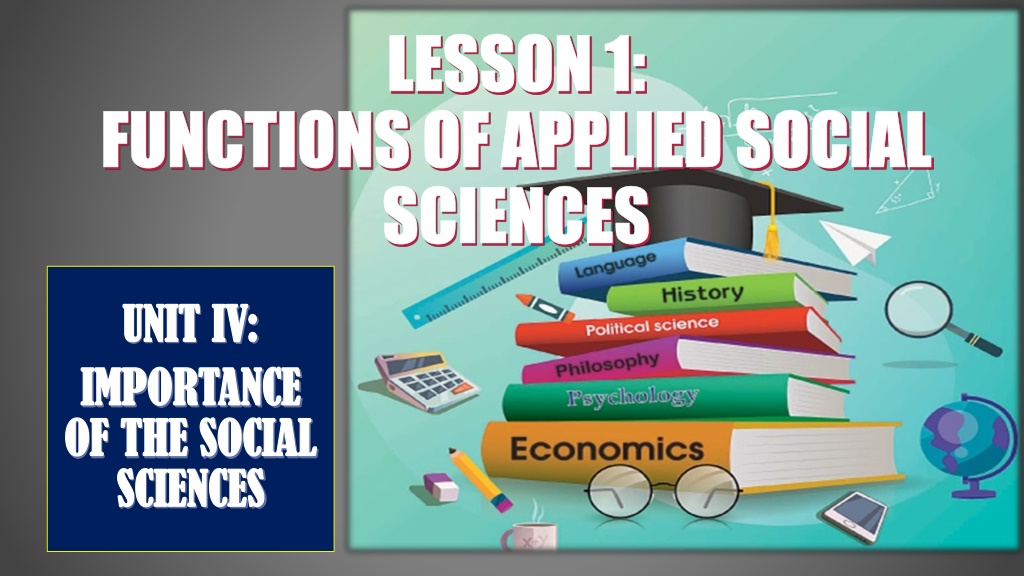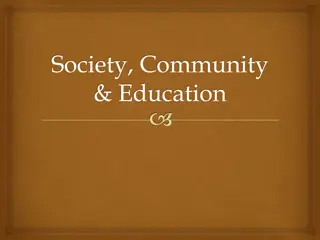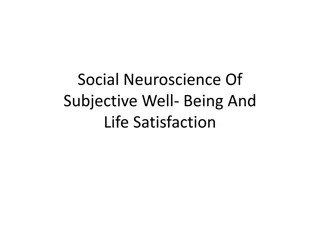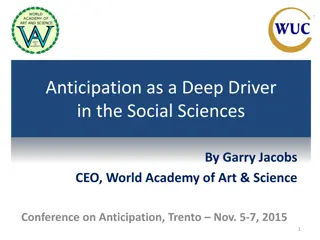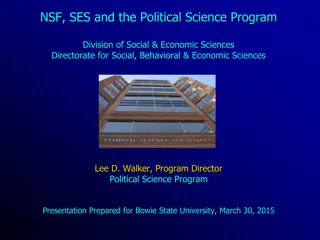Importance of Social Sciences in Modern Society
Social sciences play a crucial role in addressing societal issues and understanding human behavior within different contexts. Despite the focus on STEM fields, social sciences are essential in areas like social work, justice systems, and business. This educational content highlights the functions and significance of applied social sciences, emphasizing the need for more support and recognition in various sectors.
Download Presentation

Please find below an Image/Link to download the presentation.
The content on the website is provided AS IS for your information and personal use only. It may not be sold, licensed, or shared on other websites without obtaining consent from the author.If you encounter any issues during the download, it is possible that the publisher has removed the file from their server.
You are allowed to download the files provided on this website for personal or commercial use, subject to the condition that they are used lawfully. All files are the property of their respective owners.
The content on the website is provided AS IS for your information and personal use only. It may not be sold, licensed, or shared on other websites without obtaining consent from the author.
E N D
Presentation Transcript
LESSON 1: FUNCTIONS OF APPLIED SOCIAL SCIENCES UNIT IV: IMPORTANCE OF THE SOCIAL SCIENCES
LEARNING OUTCOMES LEARNING OUTCOMES The learners are expected to: 1. Demonstrate understanding of the functions of applied social sciences; 2. Explain each of the functions of applied social sciences; and 3. Identify situations that would require or necessitate the performance of the various functions in local/Philippine settings 4. Assess objectively through an individual project how the functions of the applied social sciences have been fulfilled in any of the following: a. case study of a counselee b. case study on integrative social work
FUNCTIONS OF APPLIED FUNCTIONS OF APPLIED SOCIAL SCIENCES SOCIAL SCIENCES WHY IS THE SOCIAL SCIENCES IMPORTANT?
Importance of the Social Sciences stated In recent (Science, Technology, and Math) sciences have received the majority of investment and support from government, universities, etc., while these subjects are no doubt important, the importance of social sciences should not be ignored. years Engineering, STEM
In fact, in areas such as social and primary care, the justice system, and business, to name just a few, Social Science is extremely important, and necessary. It is important that imbalance be addressed and more support provided sciences. therefore this very educational to the social
While for many people the words social sciences images of social workers or teachers, this is a gross misunderstanding of the range of roles available discipline, as well as the impact that it has on the wider world. In general, social sciences focus on the study of society and the relationship among individuals within society. may conjure up within this
Social subjects, including economics, political science, sociology, history, archaeology, and law. In comparison to STEM sciences, social science is able to provide insight into how science and innovation work in effect it is the science of science. In particular, social scientists are equipped with the analytical and communication skills that are important throughout organizations. Science covers a wide spectrum of anthropology, many industries and
Social subjects, including economics, political science, sociology, history, archaeology, and law. In comparison to STEM sciences, social science is able to provide insight into how science and innovation work in effect it is the science of science. In particular, social scientists are equipped with the analytical and communication skills that are important throughout organizations. Science covers a wide spectrum of anthropology, many industries and
FUNCTIONS OF THE FUNCTIONS OF THE APPLIED SOCIAL APPLIED SOCIAL SCIENCES SCIENCES
A. SELF-DEVELOPMENT Robert Gordon University (RGU) of Scotland (2016) opined that Applied Social Science is the study of the society we live in and relationships people have within that society. The course provides the launching pad for a career in the fields of sociology and psychology. This provides the learners with wider opportunities to charter their own future be it in public or private sector Enter his/her hobby here. the best
B. PERSUASION The Conference held on November 5, 2005 in Pepperdine University Malibu, California with the theme Applying The Social Science of Persuasion and Influence to the Art of Negotiation focused on the original work of Dr. Robert Cialdini on the Six Universal Principles of Persuasion. 17th Annual Interactive Six Universal Principles of Persuasion
PRINCIPLE 1: RECIPROCITY PRINCIPLE 1: RECIPROCITY People feel obligated to give back to others who have given to them. Reciprocity is the practice of exchanging things with others for mutual benefit, especially privileges country or organization to another. granted by one
PRINCIPLE 2: LIKING PRINCIPLE 2: LIKING We prefer to say yes to those we know and like. Liking is a feeling of regard or fondness.
PRINCIPLE 3: CONSENSUS PRINCIPLE 3: CONSENSUS People decide what s appropriate for them to do in a situation by examining and following what others are doing. Consensus is a opinion or decision among a group of people. generally accepted
PRINCIPLE 4: AUTHORITY PRINCIPLE 4: AUTHORITY People knowledge or perspective for guidance on how to respond AND what decision to make. Authority is the power or right to give orders, make decisions, and enforce obedience. rely on those with superior
PRINCIPLE 5: CONSISTENCY PRINCIPLE 5: CONSISTENCY Once we make a choice/take a stand, we will encounter personal pressure to behave consistently with that commitment. Consistency is conformity in the application of something, typically necessary for the sake of logic, accuracy, or fairness and interpersonal that which is
PRINCIPLE 6: SCARCITY PRINCIPLE 6: SCARCITY Opportunities when they are less available. Scarcity is the state of being scarce or in short supply; shortage. appear more valuable
